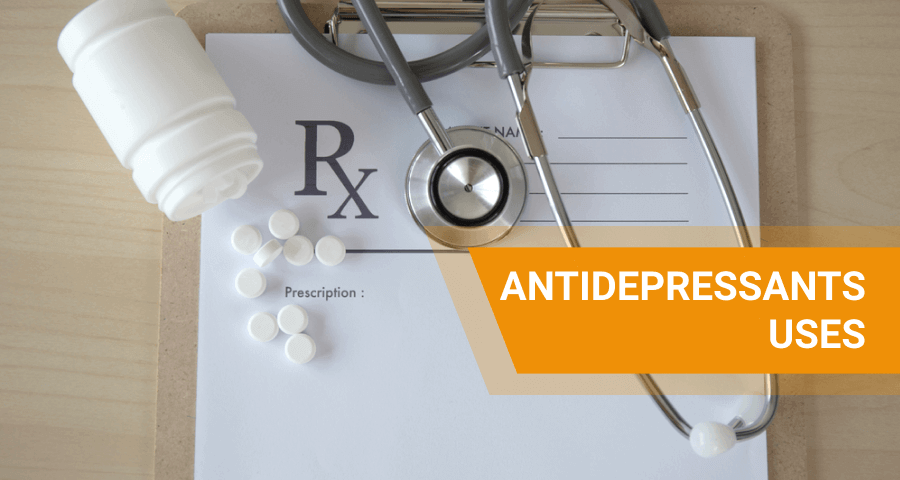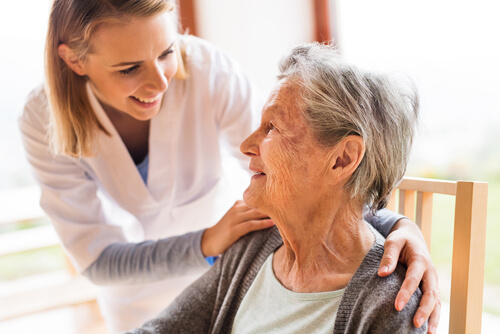
Antidepressant uses go far beyond the expected treatment of depression. The use of antidepressants is seen in everything from pain management to energy boosting. Here is what users should know about using antidepressants for various applications.
Learn About Antidepressants Uses:
- What Are Antidepressants Uses?
- What Are Age And Sex Specifications Of Use?
- Do Depression Meds Help With Anxiety?
- Do Depression Meds Help With Depression?
- Are Depression Meds Used For Sleep?
- Are Depression Meds Used For Headaches And Migraines?
- Do They Treat Bipolar Disorder?
- Do They Treat Pain?
- When Should One Take Antidepressants?

What Are Antidepressants Used For?
Depression medications were developed specifically for the use of depression treatment. However, the use of antidepressants spreads far beyond this application. Long-term use can treat many behavioral health conditions, including anxiety, ADHD, PTSD, and OCD.
Outside of behavioral health, the use of antidepressants can treat a variety of conditions:
- they have been used for IBS and Crohn’s disease;
- in women, they often are prescribed to treat menopause, PMS, and hot flashes caused by hormonal imbalances;
- sometimes they treat pain;
- there are even antidepressants that increase energy prescribed to people who are fatigued.
Exactly how a given medication is prescribed will often be determined by the class of antidepressants it belongs to and what its side effects are. There are many examples of tricyclic antidepressants being prescribed for pain, but few for treating menopause. As such, patients and their doctors must carefully consider medication and its application before deciding on one.
Age And Sex Specifications Of Use
Another consideration when opting for the use of antidepressants is which medication is best for the patients given their age and their sex. For example, teens and children are especially at risk of experiencing increased suicidal thoughts and actions after starting an antidepressant. Side effects and effectiveness of drugs can also vary between the sexes. The prescription of depression medications must be precisely tailored to the needs of the patient.
Male vs. Female
Studies have found that male and female bodies respond differently to the presence of depression medications. Additionally, for women, how their bodies respond will vary depending on if they have already gone through menopause or not.
SSRIs tend to see better results in women than in men. However, once they go through menopause, women generally feel fewer benefits from these medications.
In general, men are less likely to be prescribed depression meds than women for a variety of reasons, including physical differences and social constructs. While there are no depression meds that have been found, as yet, to function better for men than women, it is common to seek out those without sexual side effects.
Antidepressants For Under 18s
With antidepressants for children and teens, caution must be exercised. This is not just because antidepressants and suicide have a higher correlation in these populations. As it ends up, certain medications make for better antidepressants for teens and children than others.
Generally speaking, depression medicine use is highly discouraged in young children, with patients ideally being at least 12 years old before beginning treatment. However, treatment can start when children are just seven years old.
Medications best indicated for use in underaged patients include:
- Clomipramine (Anafranil)
- Duloxetine (Cymbalta)
- Escitalopram (Lexapro)
- Fluoxetine (Prozac)
- Sertraline (Zoloft)
- Fluvoxamine
- Olanzapine-Fluoxetine

Antidepressants For Elderly
Long-term use of antidepressants with elderly patients is quite common. This can be to treat depression, pain, and in some cases, antidepressants SNRI for heart problems. However, elderly individuals are more sensitive to these medications.
As such, not all medicines can be used with this population. Still, research indicates leaving depression untreated is a greater risk than the medications themselves pose. SSRIs are generally seen as the safest options; however, if treatment is monitored by a doctor.
Do Antidepressants Help With Anxiety?
It is common for doctors to prescribe antidepressants for anxiety treatment. In fact, some of them are used to treat anxiety more often than depression.
There is significant research indicating that their use for anxiety treatment delivers positive effects. Both atypical antidepressants for anxiety, SNRIs, and SSRIs are heavily used, though other classes of depression medications may also be applied depending on the needs of the patient. A lists of SSRI antidepressants have the medications most often used for anxiety.

Antidepressants For Depression
While it is what the medications are designed for, prescribing medications for depression is generally not as common as using them for anxiety. However, the effectiveness of antidepressants for depression was key in their development. All depression medications currently in use have been demonstrated to be at least somewhat effective in addressing depressive disorders.
Which medications are best will depend on the patient. Some need antidepressants that increase dopamine, while others need more serotonin. Others may be concerned about specific side effects. For example, about 70 percent of people taking them will experience sexual side effects. Patients worried about this could specifically seek out antidepressants that don’t affect libido.
It is also possible for medications to be effective at first but then patients may discover that the long-term use of depression meds results in diminished effectiveness. Ultimately, the experience is highly individual.
Antidepressants For Sleep
Another use is to treat sleep disorders. Specifically, the use of antidepressants for insomnia. While there are those that help with sleep in some patients, this is not a universal experience.
In some cases, antidepressants can worsen sleep disorders.
However, there is some debate as to its effectiveness, especially with long-term use. In fact, herbal remedies may be just as effective, with fewer side effects in most patients.
Antidepressants For Headaches And Migraines
Antidepressants for migraines and headaches are a common uses for medications. When used in this application, they are taken daily in relatively low doses. The goal of those used for headaches and migraines treatment is to prevent them from occurring, not treat the pain.
Tricyclic medicines show the most promise in treating this kind of pain. However, these medications are associated with more severe side effects than newer generation depression meds. As such, their use should only occur with significant caution, especially if the patient plans to rely on the long-term use of antidepressants.
Antidepressants For Bipolar Disorder
Bipolar disorder is often associated with depression. However, the mania experienced with it makes it very different. And this mania means that the use of depression medicines to treat it can be problematic.
The use If antidepressants for bipolar supposes that they are only prescribed in small doses, and the patients are carefully monitored. However, even at a low dose, there are concerns. Not only there is the potential to cause even more extreme highs and lows, but the use for bipolar disorder treatment risks other complications.
Case in point, people with this condition are more prone to drinking, and drinking while on antidepressants can be dangerous. Doctors and patients should look into alternative treatments whenever it is advisable.
Use For Pain Treatment
Doctors often turn to antidepressants for chronic pain. Research tends to support this use more than many other, more common applications of these medications. However, it is first-generation depression meds that are most effective.
This can be problematic given their numerous side effects. While antidepressants for nerve pain can help people get out of crippling pain, the new side effects they take on could end up being debilitating. Not to mention that many antidepressants cause weight gain, which can make the pain a patient experiences even worse.

When To Take Antidepressants
Understanding these various uses of antidepressants and the problems that can come along with them may make people wonder when to take these medicines.
In terms of when to begin taking the medications, users should discuss this with their doctor. It is generally best to go over all possible alternatives before settling on depression medicine use. If it is determined that nothing else is a suitable alternative and treatment is needed, then it is the right time to start.
To reduce side effects and get the best effect from depression meds uses, users could time their doses. Suppose that, if someone is trying to battle insomnia with their use of medications, they could take them shortly before bed. If pain during the day is a concern, using them in the morning would be best.
Users should consult with their doctor to decide when is the best time to take antidepressants. Any use of these meds should be monitored by medical staff. Self-prescription and the use of depression medications may result in severe health hazards.
Getting Helped With Misuse
Not everyone will be happy with their experience with depression medicines. These individuals will need to take care while coming off antidepressants. It is possible that they will experience better results with antidepressants over the counter than prescription medications. However, the decision is for the doctor, self-medications is strongly discouraged.
With that said, users should exercise caution and always consult with a doctor when stopping or changing medications, as where is a withdrawal period where symptoms can be problematic. Additionally, if switching, there is a risk of interactions. Patients need to know what happens if one overdoses on antidepressants, as this is a risk during the transitional period. The best option to do this is with the help of a specialist from drug rehab.
If antidepressant use becomes problematic, seek help. The only safe way to stop antidepressant use is with professional supervision. Rehab centers offer a wide range of available treatments for facilitating patients in addressing their conditions.
Page Sources
- Xu XM, Liu Y, Dong MX, Zou DZ, Wei YD. Tricyclic antidepressants for preventing migraine in adults. Medicine (Baltimore). 2017; 96(22): e6989. doi:10.1097/MD.0000000000006989. https://www.ncbi.nlm.nih.gov/pmc/articles/PMC5459715/.
- Jane Garland E, Kutcher S, Virani A, Elbe D. Update on the Use of SSRIs and SNRIs with Children and Adolescents in Clinical Practice. Journal of the Canadian Academy of Child and Adolescent Psychiatry. 2016; 25(1): 4–10. https://www.ncbi.nlm.nih.gov/pmc/articles/PMC4791100/.
- Sramek JJ, Murphy MF, Cutler NR. Sex differences in the psychopharmacological treatment of depression. Dialogues in Clinical Neuroscience. 2016; 18(4): 447–457. https://www.ncbi.nlm.nih.gov/pmc/articles/PMC5286730/.


 Written by:
Written by: 

 FindTreatment.gov
FindTreatment.gov